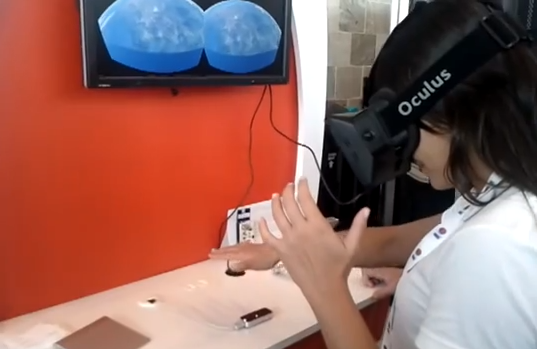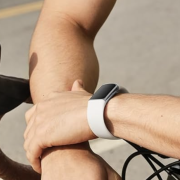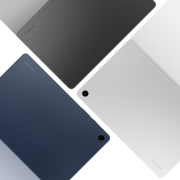In my entire life, there is one moment from a technology perspective that stands heads and shoulders above the rest purely in terms of “wowing” me: the Leap Motion + Oculus Rift + Google Earth demo set up at I/O earlier this May. Essentially, you put on the immersive VR headset, where you could see the world around you via Earth. Using Leap Motion, you could move around, and look in any direction by just moving your head.
Simply put, you were Superman. I did in fact move out towards the edge of the Earth’s atmosphere and then dive back down quickly. It was insane, it took me almost half an hour to get my sense of balance back and I almost throw up just picturing that Baumgartner moment in my head. The Oculus Rift, for all its exceptional qualities, clearly has some problems to solve.
From a technological perspective, one of the crucial ones that it needs to is how to get rid of the wires that actually provide the content displayed on the mount. As something that is aimed towards gaming, it needs a powerful machine behind it, and a PC is perfect for that. However, John Carmack, the CTO of Oculus Rift, mentioned in an interview with Engadget that Android might provide the perfect compromise for those wanting an untethered experience.
It makes perfect sense: with Google Glass and a few other projects, Android is already powering a few head-mounted displays with the only difference with Oculus Rift being that they aren’t as intrusive, with Oculus needing to take over your complete view. However, it’s Android, and Oculus Right can make any change they need to so as to provide the optimal experience.
At moments like these I can’t help but be grateful that people like Farhad Manjoo (who thought Google should save Android by close-sourcing it) are nothing more than writers and have no real power in the world. Would a closed-source Android have been better for Google? Potentially. However, are the trade-offs worth it considering what it allows everyone else to achieve? Most certainly.
[Engadget]










Wooooo Felix Baumgartner reference!
Just think of the applications this thing could have in the porn industry. ;)
Lol, why is it always about porn? I remember that same comment about Google Glass lol
Probably because of internet rule #34.
Because porn gets things done. It’s the reason VHS beat out Betamax.
Holograms would be better. Google will call it HOLOgram pr0n
oculus rift is a game changer
I think it’s really cool how well all those fun pieces of technology work so well together, and I love that Google just thought to themselves… “hmm… oculus rift, leap motion, hey… that’d be pretty sweet to use those two things to navigate Google Earth. Hey, let’s let people test drive it in the lobby…”
I’m jealous you got to test drive that @Raveesh even if it did almost make a little queezy :P
The fact that android is open source has allowed it to grow in ways Google couldn’t have possibly imagined. The only types of people who would benefit from closed android are the people who say “I don’t have time to learn any new technology or figure anything out” those kinds of people can’t survive long in the kind of world we are building.
I don’t much care what it runs, as long as it’s FULL FIELD OF VIEW IMMERSION, which the Oculus Rift still is not. Instead of using LCDs, retinal sanning (“lasers into the eyes”) HMD’s allow for better FOV, higher resolution, and much much lighter glasses.
I’m hopeful that Oculus Rift “3.0” will move to retinal scanning, because their competition already is.
Carmack mentioned in the interview with Engadget that head tracking is already a big focus in the lead up to the next developer kit and consumer release, though I’m not quite sure if he’s including retinal scanning as part of it
Yeah, I watched that same interview yesterday (all three carmack *snortles* worth), and it seems that accurate head tracking to reduce motion sickness is at the top of the list. I just hope that retinal scanning isn’t far behind.
I was SOOO excited for retinal scanning over 10 years ago when Microvision (MVIS) was top dog, but it remained too expensive until now.
Also, about 10 years ago I heard about another tech that was trying to help solve the motion sickness problem; it was called “galvonic stimulation” iirc. Basically, it made you FEEL like you were moving by tricking your brain into feeling weightless, or shifting left/right on a boat, etc.
I don’t know why it never materialized. Either HMDs weren’t widespread enough to make it profitable, or it wasn’t easy to calibrate, or maybe the government killed it over safety concerns.